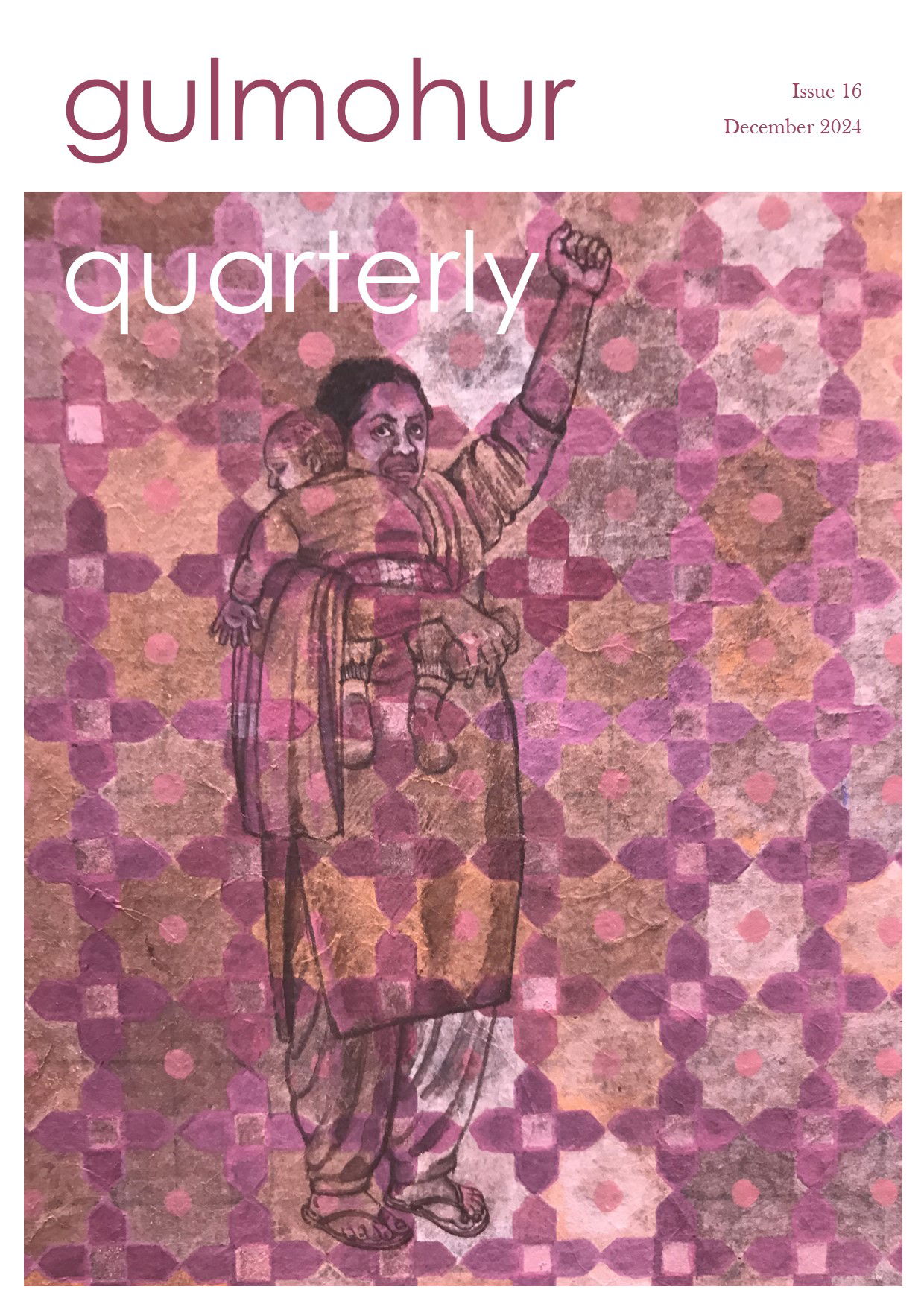Editorial: Issue 16/ December 2024

With the current issue, gulmohur completes four eventful years of fine literary publishing! We heartily congratulate all our contributors, readers, well-wishers and the editorial team. Incidentally, the cover art for this issue, an evocative work by Varunika Saraf from the times of the farmers’ protests, also commemorates four years of a remarkable people’s movement that forced the state to repeal the farm laws and its citizens to reimagine the public domain. In the brilliantly hued tiled illustration, we see a quietly foregrounded figure, of a mother with a child on her shoulder, raising her fist of resistance. We notice at once the familiar countenance of the figure and the extraordinary resolve of the resilient gesture. The gentle familiarity of the woman’s figure surges forth with the strong declaration of her participation in a struggle. The sharp gaze at the viewer implores us to encounter the moment of assertion. As the artist rightly recollects in her brief essay “On Feminist Solidarities and Radical Hope,” the state implicitly and explicitly questions the legitimacy of women as stake-holders in the theatres of democracy. Whether it’s the Tikri border or the Shaheen Bagh, it is perceived as a shift of prominence, when the so-called spectators take lead in resisting the state. It befuddles our conventional understanding when women stand in solidarity against the policies of the state. It might be a fallacious narrative, after all, with little evidential support and much patriarchal prejudice, which pushes women to the margins of our collective memories. Despite their historical role in shaping the contours of a post-colonial state and an electoral democracy, women in our history are repeatedly pushed back to the sphere of the domestic, cut off from the public, labelled out as mere witnesses of the grand spectacle. It is in negotiating their roles as active participants of public life that women reclaim their political existence and share it with the upcoming generations of citizens. In life, as in art, it is indeed the radical hope of liberation into an equal, free world that propels the protagonists and fuels their choices—of raising their fist against oppression, of joining their hands in solidarity, of dreaming of all hands free from cuffs, of handing down a legacy of justice and love, of handling others with care and dignity.
*
Although our quarterly issues are not themed, the current issue has a fair share of writings on women’s experience, patriarchal violence, and gender justice. One of the short stories in this issue explores the notion of assertion and resistance in death, while another takes down the patriarchal web of exploitation in a straight scornful account. Another fictional narrative recounts the horrors of trauma in a militarized state, turning humorous an ordeal of existential threat lived on a daily basis by many. The poets in this issue have brilliant articulations of their multifarious concerns. On broaching the subject of essential household labour, a poet asks: “Who made dinner while Rumi whirled?/ Who mopped the floors when Rabindranath sat in quiet contemplation?” Others record the activities of a week with their mother, speculate about a deformity of a mother’s foot, and playfully work the adage of a ‘mother’-tongue. The political in poetry takes here the form of overcoming “these pleasures of fascism,” while recording the incarcerations and occupations. Palestine and Kashmir come to poets–a tragedy that it doesn’t come to us as overwhelmingly even as another year ends! Language itself becomes the poet’s means to register their deep discontents with the contemporary. It is then in ‘seeing’ this enmeshment of the everyday and the ever-growing discords of inhumane forces, the sublimity of life and the simultaneous extinguishing of its basic possibilities, that we render language and literature with any meaningful capacity at all.
*
gulmohur stands in solidarity with the jailed activists and intellectuals of the Bhima Koregaon case; the victims of communal hatred and of state violence; the victims of caste and gender violence; the victims of fundamentalist oppression anywhere in the world; and with all those who dissent in the spirit of democracy to safeguard our ever-diminishing freedoms. We stand for the liberation of Palestine.
*
We would like to express our profound thankfulness to our readers and well-wishers everywhere. We are immensely grateful to all our friends (on and off social media) who have helped us reach out. We also thank our contributors for trusting us with their submissions.
*
We hope you enjoy reading Issue 16 of the quarterly. Finally, we wish you a happy and prosperous new year! May we all awaken to more awareness and courage in the coming days.
Editors
gulmohur
December 2024